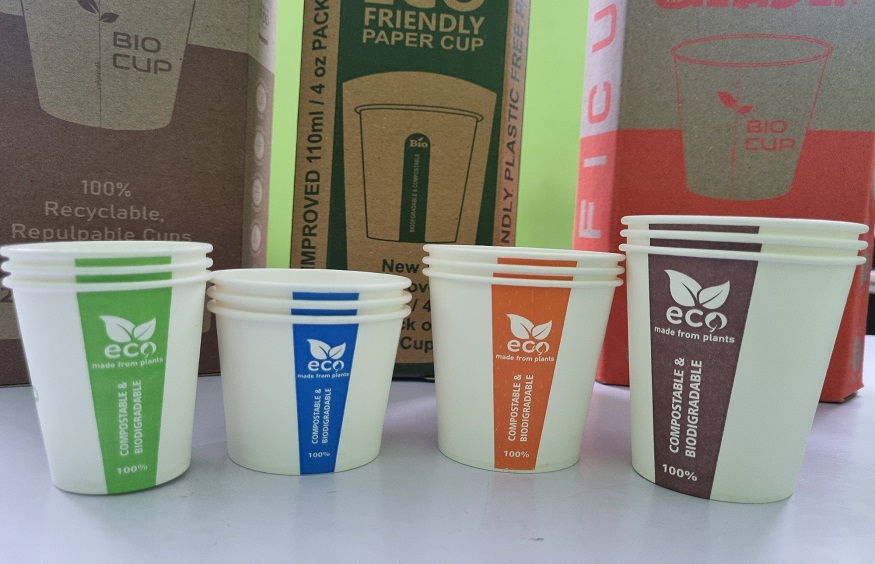Biodegradable paper cups have emerged as a sustainable alternative to traditional plastic and foam cups, addressing the growing concerns about environmental pollution and waste management. As society becomes increasingly aware of the detrimental effects of single-use plastics on our planet, biodegradable options present a viable solution that benefits both consumers and the environment. This article explores the various environmental advantages of using disposable paper cups, highlighting their role in reducing waste, conserving resources, and promoting a healthier ecosystem.
1. Reduction of Plastic Waste
One of the most significant environmental benefits of biodegradable paper cups is their ability to reduce plastic waste. Traditional plastic cups can take hundreds of years to decompose, contributing to the ever-growing problem of plastic pollution in landfills and oceans. In contrast, biodegradable paper cups are designed to break down naturally within a much shorter time frame—typically within a few months under proper conditions. This rapid decomposition helps minimize the volume of waste that ends up in landfills, reducing the overall environmental burden.
2. Compostability
Many biodegradable paper cups are compostable, meaning they can be disposed of in composting facilities where they will decompose into nutrient-rich organic matter. This process not only diverts waste from landfills but also contributes to soil health by returning valuable nutrients back to the earth. When biodegradable cups are composted, they can help improve soil structure and fertility, promoting healthier plant growth and supporting local ecosystems.
3. Use of Renewable Resources
Biodegradable paper cups are typically made from renewable resources such as plant-based materials, including wood pulp or sugarcane bagasse. These materials are sourced from sustainably managed forests or agricultural practices, reducing reliance on fossil fuels and non-renewable resources associated with traditional plastic production. By utilizing renewable materials, biodegradable cups contribute to a more sustainable production cycle that aligns with eco-friendly practices.
4. Lower Carbon Footprint
The production process for disposable food packaging generally has a lower carbon footprint compared to that of traditional plastic cups. Manufacturing biodegradable products often involves less energy-intensive processes and utilizes fewer harmful chemicals. Additionally, because these cups are made from renewable resources, their overall environmental impact is significantly reduced throughout their life cycle. By choosing biodegradable paper cups, consumers can make a positive impact on the environment by supporting products with a lower carbon footprint and promoting sustainable manufacturing practices.
5. Non-Toxic Composition
Biodegradable paper cups are typically free from harmful chemicals such as bisphenol A (BPA) and phthalates, which are commonly found in many plastic products. These toxic substances can leach into food and beverages, posing health risks to consumers and contributing to environmental pollution when disposed of improperly. By choosing biodegradable options, consumers can enjoy their drinks without worrying about potential health hazards associated with toxic materials.
6. Mitigation of Ocean Pollution
Plastic pollution in oceans is a critical environmental issue affecting marine life and ecosystems worldwide. Biodegradable paper cups help mitigate this problem by reducing the number of non-decomposable items entering marine environments. When disposed of properly, these cups break down naturally rather than contributing to the accumulation of plastic debris that threatens marine animals and habitats.
7. Encouraging Sustainable Practices
The widespread adoption of biodegradable paper cups promotes a culture of sustainability among consumers and businesses alike. By choosing eco-friendly alternatives, individuals can contribute to reducing their ecological footprint while encouraging companies to adopt more sustainable practices in their operations. This shift towards environmentally conscious consumption fosters greater awareness about the importance of sustainability and motivates further innovations in eco-friendly packaging solutions.
8. Supporting Local Economies
As demand for biodegradable products increases, it creates opportunities for local businesses that produce sustainable materials and products. This shift not only supports local economies but also encourages job creation in industries focused on sustainability and environmental responsibility. By investing in biodegradable options, consumers contribute to a circular economy that prioritizes resource conservation and ethical production practices.
9. Consumer Awareness and Responsibility
The increasing popularity of biodegradable paper cups has significantly contributed to raising consumer awareness about environmental issues, particularly those related to waste management and pollution. As individuals become more informed about the detrimental effects of single-use plastics and non-biodegradable materials on the planet, they are more likely to reconsider their everyday choices. This shift in mindset encourages consumers to actively seek sustainable alternatives that align with their values regarding environmental responsibility.
As awareness grows, people recognize that their purchasing decisions have far-reaching consequences, not only for their immediate surroundings but also for global ecosystems. This realization fosters a sense of stewardship, motivating consumers to prioritize eco-friendly products over conventional options. By choosing biodegradable paper cups, individuals are not only reducing their ecological footprint but also supporting companies that prioritize sustainability.
This heightened sense of responsibility can lead to broader changes in consumer behavior, driving demand for innovative and sustainable products across various industries. Ultimately, the rise of biodegradable paper cups serves as a catalyst for positive environmental change, empowering consumers to make informed decisions that contribute to a healthier planet for future generations.
10. Future Innovations
The development of biodegradable food packaging containers is just one aspect of ongoing innovations aimed at creating more sustainable packaging solutions. As technology advances and research continues into new materials and production methods, we can expect even more effective alternatives that further reduce environmental impacts. Innovations such as plant-based coatings or fully compostable materials will enhance the functionality and appeal of biodegradable products while addressing consumer needs for convenience.
Biodegradable paper cups offer numerous environmental benefits that make them an attractive alternative to traditional plastic options. From reducing plastic waste and promoting compostability to supporting local economies and fostering consumer awareness, these eco-friendly products play a vital role in addressing pressing environmental challenges.
By choosing biodegradable options for everyday use, whether at coffee shops, events, or home, consumers can actively participate in creating a more sustainable future while enjoying their favorite beverages guilt-free. As we continue to navigate the complexities of modern consumption patterns, embracing biodegradable products like paper cups will be crucial in promoting a healthier planet for generations to come.

